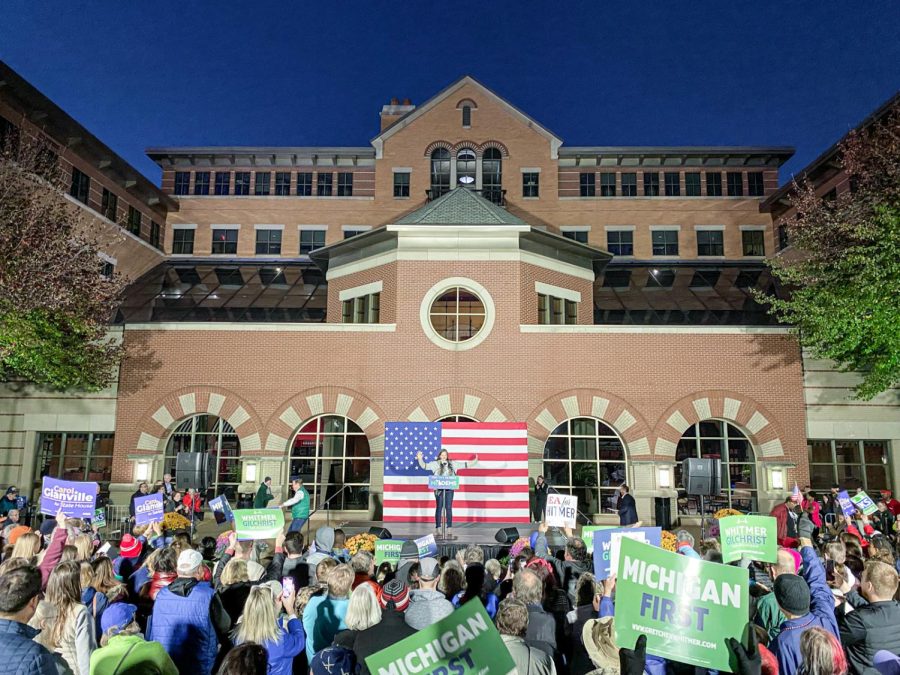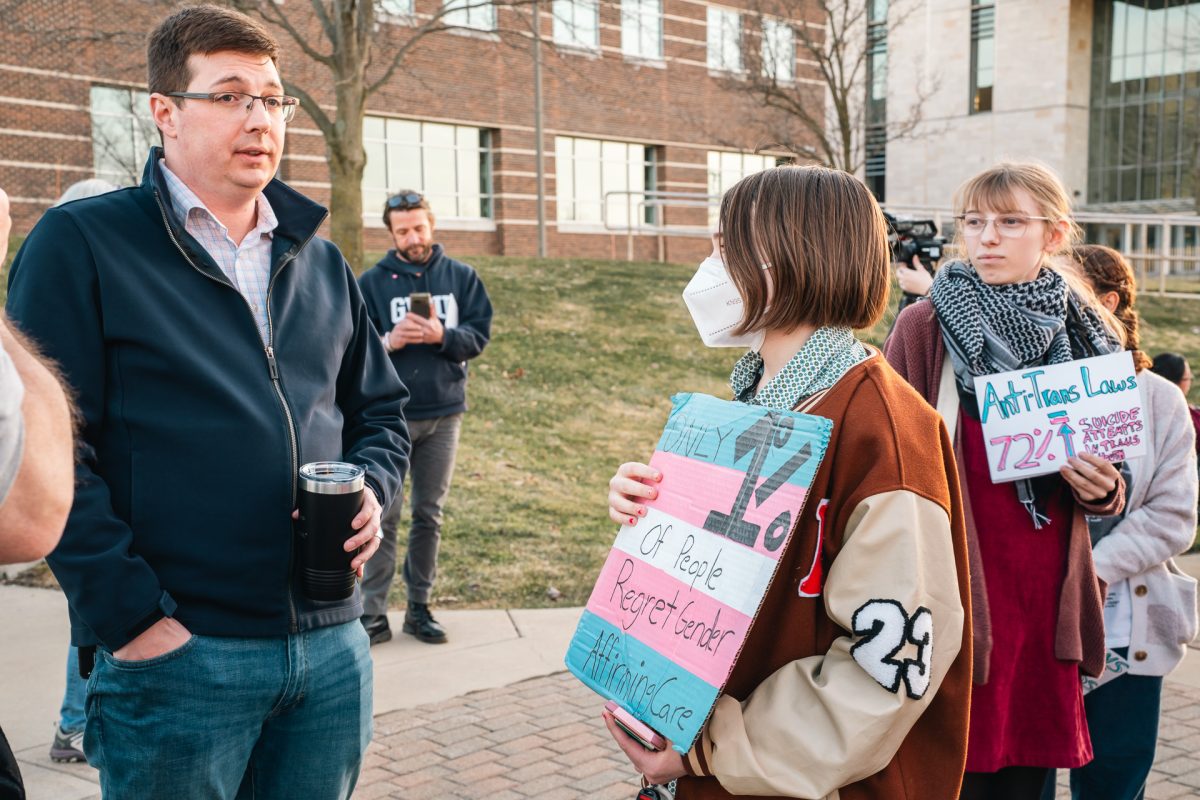Blue Wave: Democrats sweep Michigan offices in history-defying midterms
Nov 14, 2022
Multitudes of electoral polls in the run-up to Nov. 8’s midterm elections signaled what was expected to be what many referred to as a “red wave” that would usher the Republican Party into wide margins of control on Capitol Hill and ensure comfortable victories in key races throughout the country. With a floundering national economy, dismal approval ratings for President Joe Biden and historical precedent that routinely spells danger for the party whose president is experiencing their first midterm elections in the White House, such large Republican gains were projected as all but certain.
However, the opposite proved to be true in the battleground state of Michigan, where Election Day saw Democrats sweep offices across the state.
A number of critical victories granted the Democratic Party control of not only the three statewide elected offices of governor, secretary of state and attorney general, but also majorities in both the Michigan House of Representatives and the Michigan Senate.
This marked the first time in nearly four decades that the party has been able to claim both the governorship and the legislature simultaneously.
Incumbent Democratic Governor Gretchen Whitmer addressed supporters on election night following the first projections released in the race revealing her victory.
“We have come a long way, Michigan,” Whitmer said. “We are thrilled, thrilled at the unexpected high turnout. We are thrilled that the three ballot initiatives got passed.”
In laying claim to her second term, Whitmer emphasized a commitment to bipartisanship in her first term that she indicated she intended to carry into the next.
“The prospect of leading this state for four more years is something for which we are incredibly grateful and excited about,” Whitmer said. “Regardless of who is in office, we will always work with anyone who actually wants to solve a problem because there’s nothing more important than the people of this state to us – all of the people of this state.”
Secretary of State Jocelyn Benson and Attorney General Dana Nessel, who polls had indicated was in a tight race against Republican challenger Matt DePerno for weeks ahead of the election, also won their races to continue in the positions for another four years.
In addition to the creation of the Independent Citizens Redistricting Commission that oversaw the state’s redistricting process mandated by the 2020 census and ensured fairer legislative districts, a higher-than-average turnout from young and college voters in the state has also since been credited for Democrats’ numerous victories.
At Grand Valley State University, hundreds of students utilized the university’s Allendale Satellite Clerk’s Office to vote and swing the precinct heavily in Democrats’ favor.
In Allendale Township’s Precinct 5, the vast majority of which is comprised of north and central areas of GVSU as well as off-campus apartments, Governor Whitmer decisively defeated Republican challenger Tudor Dixon with approximately 72% to Dixon’s 26% in what is otherwise a reliably Republican Ottawa County.
Similar margins of victory were enjoyed by those including Hillary Scholten, the Democratic candidate and now the Congresswoman-elect for Michigan’s 3rd Congressional District, as well as for the passage of Proposal 3 that will now, following its passage, guarantee residents abortion rights in the Michigan Constitution reminiscent of those established under the U.S. Supreme Court’s 1973 Roe v. Wade ruling.
Capitalizing on such potential support for Democratic nominees and initiatives among young voters was seen as a key strategy within the Whitmer campaign and Democrats statewide.
“College students and the youth vote are incredibly important,” Whitmer told the Lanthorn at her final cross-state tour rally ahead of Election Day on GVSU’s Pew Campus. “They have the longest stake in the outcome of this election – in the outcome of every election – and we’ve got a lot to fight for right now. Voting rights, reproductive rights, civil rights, the ability to live without discrimination, to get a degree without going into a life of debt, to combat climate change – all of these things are on this ballot and that’s why we wanted to be on a GVSU campus with the amazing Hillary Scholten.”
Following their widespread victory, Democratic leadership in the legislature have signaled their intent to push forward with initiatives long stalled under the stewardship of Republican majorities. According to reporting from the Detroit Free Press, such legislative priorities are likely to include topics like right-to-work, gun reform, education reform, ethics reform, expanding LGBTQ civil rights protections and ending the state’s retirement tax.
Moving quickly to establish an apparatus for when they take control, Democratic legislators have since named Sen. Winnie Brinks (D-Grand Rapids) as the next Senate Majority Leader and Rep. Joe Tate (D-Detroit) as the next Speaker of the Michigan House. Brinks and Tate will be the first female and the first Black man to hold their positions in the state’s history.
“I am honored to be elected by my peers to lead the first Democratic Majority in the Michigan Senate since 1983,” Brinks said in a statement released following her election to the role. “Along with Democratic leadership in the House and governor’s office, we are ready to lead a legislature that prioritizes people over politics.”
While judicial nominees now appear under a nonpartisan section of the ballot in Michigan, a victory for Democratic-nominated Justice Richard Bernstein also secured a continuing majority of Democratic-backed justices on the Michigan Supreme Court.
National Democrats fend off highly anticipated “red wave,” secure U.S. Senate
Beyond state boundaries national Democrats, to a lesser extent, were able to keep Republican gains in the U.S. Congress at bay. Instead, the party succeeded in keeping the GOP’s projected House majority to a very slim margin and securing control over the U.S. Senate for the next two years in what was expected to be an election mired in numerous key victories for Republicans.

Following the projected victory of Sen. Catherine Cortez-Masto (D-NV) on Nov. 12, Democrats were assured continued control over the U.S. Senate with at least 50 Democratic senators and a tie-breaking vote from Vice President Kamala Harris in her capacity as Senate president.
While control of the House of Representatives had still not been finalized as of Nov. 13, Democrats had already begun signaling optimism and celebration over their victory in the Senate.
“This election is a victory – a victory and a vindication for Democrats, our agenda and the American people,” Senate Majority Leader Chuck Schumer (D-N.Y.) said.
Highlighting the centrality of a peaceful and respected elections process to a functioning democracy, the end of the contest for the Senate, Schumer said, demanded a similar end to the growing intimidation of election officials and others operating the ongoing counts in other states.
“We can disagree on so many issues, that’s fair, but let’s not have this kind of divisive negativity,” Schumer said. “Let’s not have the condonation of viciousness and even violence against poll workers, against so many others. Let us try to come together.”
Despite souring views over the state of the national economy and the effectiveness of the Biden administration, voters across the country sided with Democratic candidates warning of a threat to the continuance of American democracy should Republicans rise to claim expansive powers both in Congress as well as in key swing states.
Many GOP candidates for influential offices had signaled hesitancy or outright refusal to accept the results of the 2020 election that saw Joe Biden ascend to the presidency. Many such candidates, including the Republican candidate for secretary of state in Michigan, Kristina Karamo, faced resounding defeats at the ballot box.
As ballots on the West Coast continue to be counted in the final races that will determine control of the House, such slim projected majorities will likely mean both parties are entering a new 118th Congress in which deal-making and compromise will be essential in ensuring any legislative progress over the next two years.



























